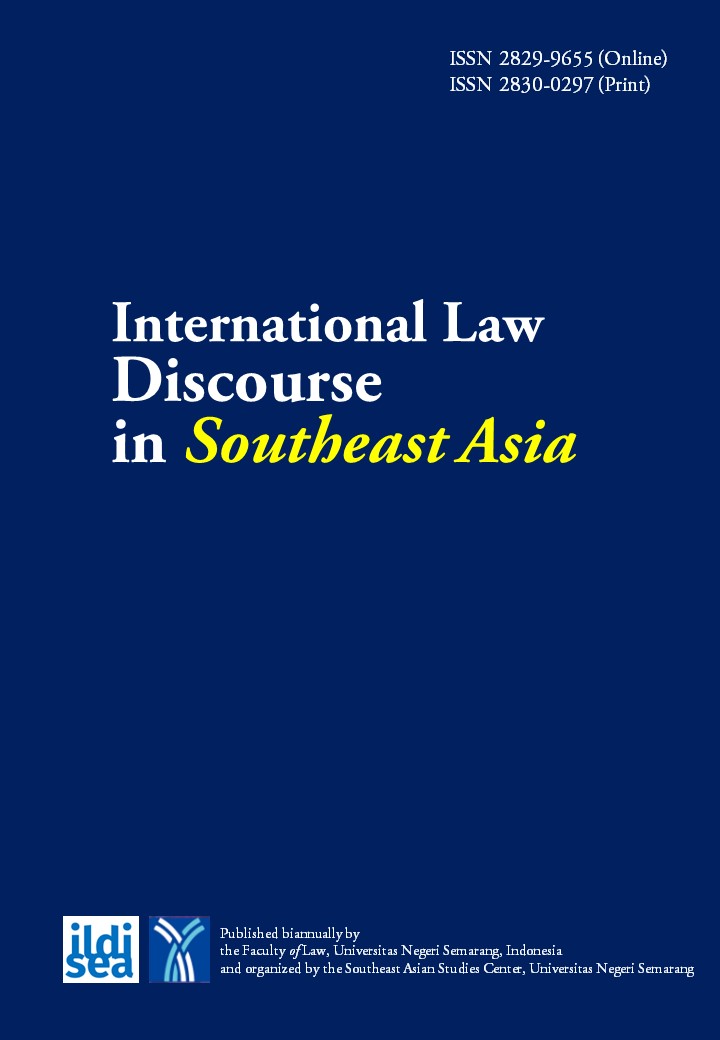Framework for the Implementation of the UN Guiding Principles on Business and Human Rights for the Protection of Women's Rights in Business Activities in Indonesia
Main Article Content
Abstract
The UN Guiding Principles on Business and Human Rights (UNGPs) is adopted as the first international instrument that provides answer to the long debate on whether or not a business has human rights responsibilities. Although the state and business have different responsibilities towards the fulfillment of human rights in business activities, the UNGPs emphasizes the urgency of a gender dimension for all stakeholders in implementing its principles. The purpose of this study is to describe the responsibilities of business actors in implementing the gender dimensions of the UNGPs and to examine its application in Indonesia. The research uses a normative juridical method with a descriptive analytical and statue approach. The result of the study shows that the adoption of the UNGPs has been carried out in Indonesia through the National Action Plan for Human Rights with women as one of the focus groups. However, the implementation has not comprehensively complied with the overall gender perspective in the UNGPs principles.
Article Details

This work is licensed under a Creative Commons Attribution-ShareAlike 4.0 International License.
References
Ashini, Adzkar Ahsini, et.al. (2020). Perspektif Gender dan Hak Anak dalam Bisnis dan Hak Asasi Manusia: Perempuan dan Anak di Bawah Kuasa Korporasi di Indonesia. Jakarta: ELSAM.
Asshidddiqie, Jimly (2005). Hukum Tata Negara dan Pilar-pilar Demokrasi. Jakarta: Konstitusi Press.
Bader, Christine Bader (2012). The U.N. Guiding Principles on Business and Human Rights Analysis and Implementation. A Report from the Kenan Institute for Ethics Duke University.
https://kenan.ethics.duke.edu//wp-content/uploads/2018/02/The-New-Regulators-MSI-Database-Report-1.pdf
Buchanan, A. (2013). The Heart of Human Rights. Oxford University Press. Retrieved 11 Jul. 2022, from https://oxford.universitypressscholarship.com/view/10.1093/acprof:oso/9780199325382.001.0001/acprof-9780199325382.
Buhmann, K., Björn, F., & Voiculescu, A. (2018). Business & human rights research methods. Nordic Journal of Human Rights, 36(4), 323-332. DOI: 10.1080/18918131.2018.1547522
Business & Human Rights Initiative (2010). How to do Business with Respect for Human Rights: A Guidance Tool for Companies. the Hague: Global Compact Network Netherlands. https://d306pr3pise04h.cloudfront.net/docs/issues_doc%2Fhuman_rights%2FResources%2Fhow_to_business_with_respect_for_human_rights_gcn_netherlands_june2010.pdf
Choudhury, Barnali Choudhury. “Balancing Soft and Hard Law for Business and Human Rights?”. International & Comparative Law Quarterly, 67 (4), 961-986. DOI: https://doi.org/10.1017/S0020589318000155
Fellmeth, Aaron Xavier (2016). Paradigms of International Human Rights Law. Oxford: Oxford University Press.
https://nasional.sindonews.com/read/502278/13/wamenkumham-sebut-ranham-fokus-perlindungan-ham-pada-kelompok-rentan-1628143691?showpage=all
https://www.hukumonline.com/berita/a/ranham-generasi-kelima--pr-besar-melanjutkan-komitmen-penegakan-ham-di-indonesia-lt60a36cbb42b48/?page=3
https://www.ohchr.org/en/special-procedures/wg-business/gender-lens-ungps
Hunt, Abigail and Moizza Binat Sarwar (2017). “Women’s Economic Empowerment at International Level”. Committee on Women’s Rights and Gender Equality (FEMM) of the European Parliament.
Kasin, Ifdhal (2014). Bagaimana Menjalankan Bisnis dengan Menghormati Hak Asasi Manusia: Sebuah Alat Panduan bagi Perusahaan. Jakarta: Elsam.
Komisi Nasional Hak Asasi Manusia (2020), Laporan Tahunan Komnas HAM 2020. https://www.komnasham.go.id/files/20210830-laporan-tahunan-komnas-ham-ri--$R1X5O.pdf
Majda El Muhtaj (2011). Relasi Bisnis & HAM untuk Indonesia Bermartabat, Jurnal HUMANITAS, Pusham Unimed, edisi Vol. II, No. 1, Juni 2011
Meyersfeld, B. (2013). Business, Human Rights and Gender: A Legal Approach to External and Internal Considerations. Dalam S. Deva & D. Bilchitz (Eds.), Human Rights Obligations of Business: Beyond the Corporate Responsibility to Respect? (pp. 193-217). Cambridge: Cambridge University Press.
Narbuka, Cholid & Abu Achmadi (2005). Metodologi Penelitian Hukum, Cet.VI. Jakarta: Ghalia.
Peraturan Presiden No. 53 Tahun 2021 tentang Rencana Aksi Nasional Hak Asasi Manusia Tahun 2021-2025
Prihandono, Imam dan Rully Sandra (2018). Kertas Kebijakan: Menuju Implementasi Prinsip-prinsip Pandunan PBB tentang Bisnis dan HAM di Indonesia. Jakarta: Infid.
Ruggie, John Gerard (2011). Report of The Special Representative of The Secretary-General on the Issue of Human Rights and Transnational Corporations and Other Business Enterprises, John Ruggie: Guiding Principles on Business and Human Rights: Implementing the United Nations “Protect, Respect and Remedy” Framework, A/HRC/17/31. Geneva: UN. https://digitallibrary.un.org/record/705860?ln=en#record-files-collapse-header.
Rully Sandra, et.al. (2021). Compatibility of the World Bank’s Ease of Doing Business Index with UNGPs on Business and Human Rights. Journal of Legal, Ethical and Regulatory Issues Volume 24, Issue 5, 2021.
Soemitro & Rony Hanitjo (2010), Metodologi Penelitian Hukum. Yogyakarta: Ghalia Indonesia.
The United Development Programme (UNDP) & United Nations Working Group on Business and Human Rights (2019). Gender Dimensions of the Guiding Principles on Business and Human Rights. presented during the 41st session of the Human Rights Council, 26 Juni 2019.
Tim Penyusun (2018). Buku Saku: Prinsip-Prinsip Panduan untuk Bisnis dan Hak Asasi Manusia: Kerangka Perserikatan Bangsa-Bangsa Perlindungan, Penghormatan ̧ dan Pemuliha. Jakarta: Konsil LSM Indonesia dan ICCO.
UN Office of the High Commissioner for Human Rights (2011). Guiding Principles on Business and Human Rights: Implementing the United Nations “Protect, Respect and Remedy” Framework A/HRC/17/31. United Nations HR/PUB/11/04. https://www.ohchr.org/sites/default/files/documents/publications/guidingprinciplesbusinesshr_en.pdf
UN Working Group (2019). Gender Dimensions of the Guiding Principles on Business and Human Rights, Report of the Working Group on the issue of human rights and transnational corporations and other business enterprises. Human Rights Council Forty-First Session General Assembly, A/HRC/41/43.
Waagstein, Patricia Rinwigati (2019). Corporate Human Rights Responsibility: A Continuous Quest for an Effective Regulatory Framework. Uppsala: Uppsala Univerrsitet.
Waagstein, Patricia Rinwigati. Business and Human Rights in Indonesia: From Principles to Practice. Human Rights Resource Centre. http://hrrca.org/wp-content/uploads/2015/05/BHR-in-Indonesia.pdf
World Bank, Ease of Doing Business Rankings. Retrieved July 10, 2022, from https://www.doingbusiness.org/en/rankings
